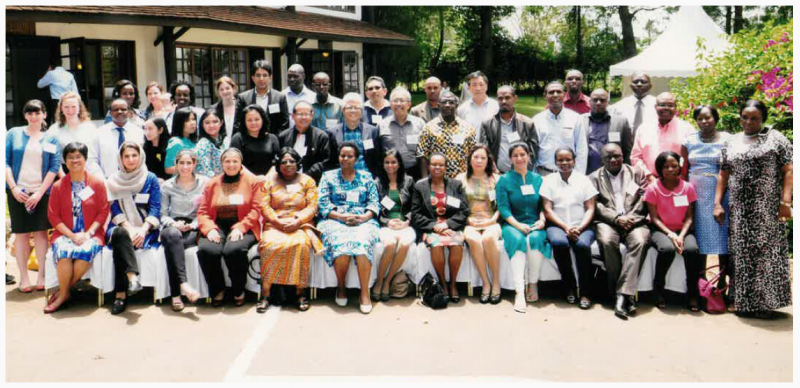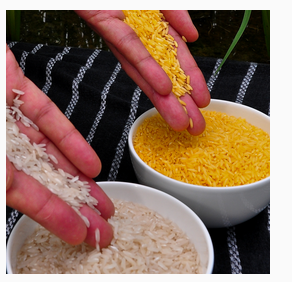Grassroots from the Ground Up: The Alliance for Science s First Course
How do you build a successful grassroots campaign as opposed to random, haphazard campaigning and #askforevidence instead of caving to anti-GMO activists? These were just some of the questions addressed during the Alliance for Science s first Biotechnology Leadership Course, held in Nairobi, Kenya, April 10-11. The two-day course involved intensive training for leaders around the globe who are committed to advocating for increased access to agricultural innovations, including biotechnology. There are many passionate participants eager to grow and strengthen the Alliance, said Sarah Davidson Evanega, director of the Alliance. She noted that some of the course goals were to provide participants with the foundational skills, knowledge and tools needed to be successful in the environment of an integrated campaign, as well as build a powerful global network of grassroots campaigners.
The 48 participants in the course came from 16 countries, including Burkina Faso, Egypt, Ethiopia, Ghana, India, Indonesia, Iran, Kenya, Malaysia, Nigeria, Philippines, South Africa, Tanzania, Uganda, Zimbabwe and the USA.
The course was facilitated, in part, by Margaret Karembu, Director of the Africa Office of International Service for the Acquisition of Agri-biotech Applications (ISAAA Africenter).
One of the most helpful take-home messages for me, said Karembu, who is actively involved in strengthening capacity for biosafety communication and political outreach for informed choices on modern agricultural biotechnology in Africa, is that it is possible to build a strong volunteer network provided there are tangible foreseen benefits even with non-fiscal incentives. Since some of the participants have been involved in this arena for 10 to 15 years now, Karembu also said she would have liked to have had more case studies so that the group could critique a successful versus a failed campaign to capture lessons learned.
Instructors included Polly Holmberg from the Alliance, and Kate Catherall, Camille Nickow and Viraj Doshi from 270 Strategies.
270 is a company that specializes in building movements, engaging people and winning. Most of the members of their team cut their teeth on the Obama campaigns for the presidency, said Evanega. They are extremely effective at communicating how to build grassroots movements by engaging and mobilizing volunteers and empowering networks of supporters.
The curriculum included sessions on the Theory of Change, Structuring Grassroots Empowerment, The Ladder Model of Engagement, Structure, Phases and Tactics for on-the-ground Campaigns, Establishing Metrics, Setting Goals and Reporting.
Sitting in a room with participants from 15 other countries enabled me to learn from their experiences in grassroots campaigning and in effective biotech communication, said Anita Tibasaaga, the media and public relations officer at the Uganda Bio-sciences Information Center (UBIC). I was also able to learn tips to enhance my work, for instance using media monitoring software and processes to track media coverage of biotech issues. The networking experience allowed me to assess the level of my country’s media and communication efforts towards increasing acceptability of GM technology.
Tibasaaga said she also learned that capacity building, persuasion, and mobilization are building blocks to successful grassroots campaigning.
It was powerful for some participants to realize that a culture of volunteerism exists in countries that often claim they do NOT have such a culture, said Holmberg, who helped organize the course.

Nigeria Approves Biosafety Bill, Paving the Way for GE Crops
 On April 21, Nigeria s outgoing President Goodluck Jonathan signed the country s Biosafety Act, paving the way for the introduction of biotech crops that will play a critical role in ensuring food security for Africa s most populous nation.
On April 21, Nigeria s outgoing President Goodluck Jonathan signed the country s Biosafety Act, paving the way for the introduction of biotech crops that will play a critical role in ensuring food security for Africa s most populous nation.
Jonathan s approval, which concludes a nearly 10-year effort to gain passage of the Biosafety Act, was hailed by proponents as a critical step in giving Nigerian farmers access to GE seeds that are resistant to drought and pests, and that could vastly reduce the need for costly fertilizers and insecticides.
[Biotech] will create more employment, boost food production that will put a smile on the faces of farmers and elevate hunger if given good attention by government, said Professor Lucy Jumeyi Ogbadu, the Director General and CEO of Nigeria s Biotechnology Development Agency, in a release.
I shed tears of joy when I heard the news. I screamed like I never did before, said Rose Suniso Gidado, who has fought for the passage of the bill since 2009. Gidado, the Open Forum on Agricultural Biotechnology s Nigeria coordinator, said in a release that the law will have an immediate impact. Nigeria can without delay commercialize Bt maize, herbicide tolerant soy beans, which are already in South Africa, Burkina Faso and Egypt. This can lead to increased yield productivity to ensure food security and industrial growth.
Nigeria joins a growing League of Biotech Nations in Africa. According to the African Biosafety Network of Expertise (ABNE), Nigeria becomes the ninth African nation with a biosafety law that permits confined field trials, joining South Africa, Burkina Faso, Ghana, Egypt, Kenya, Togo, Tanzania, and Mali. Three African countries are currently cultivating GM crops: South Africa, Sudan, and Burkina Faso.
I want to thank everyone who has worked tirelessly with us so far, providing workable strategies, moral and financial support, to ensure that President Jonathan signed this bill into law, Gidado said. Looking ahead, she said, It s the beginning of another journey. The fight to change mindsets, win hearts using science-based and factual information must continue.
For more on Nigeria s Biosafety law, please read OFAB s recent press release.
How I Got Converted to GMO Food: A Report from Bangladesh

 Mohammed Rahman used to spray his crops with insecticides as many as three times a weeks; he no longer needs to spray. His productivity has doubled. Rahman now sells his brinjal at a small premium at local market, billing them as insecticide free. His profits are increasing.
Mohammed Rahman used to spray his crops with insecticides as many as three times a weeks; he no longer needs to spray. His productivity has doubled. Rahman now sells his brinjal at a small premium at local market, billing them as insecticide free. His profits are increasing.
Rahman s story was reported last month by the Alliance s Mark Lynas, who saw firsthand the transformative impact of GE eggplant on the lives of smallholder farmers in Bangladesh. Writing for the New York Times, Lynas described how Bt eggplant provided by the government-run Bangladesh Agricultural Research Institute has eliminated the need for dangerous and costly pesticides for the 108 farmers participating in the crop trial. Although Lynas s report reveals the life changing potential of Bt brinjal, it also shows the ominous challenges facing scientists and farmers in Bangladesh, and throughout the developing world. Because Bt brinjal is a GMO, Lynas writes, It is Public Enemy No.1 to environmental groups everywhere Campaign groups based in Dhaka are suing to have the pest-resistant eggplant banned, adding that activists had visited some of the Bt brinjal test fields and tried to pressure the farmers to uproot their crops.
In his piece titled, How I Got Converted to GMO Food, Lynas, who once was a leading opponent of GMO crops, makes a powerful case for the urgent adoption of biotech crops in the developing world for both food security and environmental protection. As someone who participated in the early anti-GMO movement, I feel I owe a debt to Mr. Rahman and other farmers in developing countries who could benefit from this technology.
Read the full New York Times piece here, and see more photos from Lynas s recent visit with Bangladesh s Bt brinjal farmers on the Alliance s site.
Golden Rice Scientists Receive White House Humanitarian Award
 Last month, the White House honored three of the Golden Rice Project s leading scientists not for their scientific accomplishment, but for an intellectual property innovation one that has created the enabling conditions for tens of millions of people to benefit from Vitamin-A enhanced rice.
Last month, the White House honored three of the Golden Rice Project s leading scientists not for their scientific accomplishment, but for an intellectual property innovation one that has created the enabling conditions for tens of millions of people to benefit from Vitamin-A enhanced rice.
In an April 20 ceremony, the United States Patent and Trademark Office (USPTO) awarded its Patents for Humanity award for nutrition to Adrian Dubock, who, as a former scientist at Syngenta, helped arrange for the intellectual property behind the Golden Rice research to be made available free of charge to developing countries.
Dubock shared the prize with golden rice s co-inventors Ingo Potrykus of the Swiss Federal Institute of Technology in Zurich and Peter Beyer of the University of Freiburg in Germany, who granted Syngenta the rights to develop the technology. In 2004, Syngenta announced that it had no continuing interest in commercializing golden rice but would continue to support its development as a humanitarian project.
In honoring the three scientists, the US Patent and Trade Office not only highlighted the potential of golden rice to combat Vitamin A deficiency, which kills an estimated 200,000 and 300,000 children every year, but also underscored the importance of public-private partnerships and royalty-free access to modern farming technologies.
For more information on how royalty-free access is enabling public sector organizations such as the International Rice Research Institute to continue to develop golden rice, please visit the Golden Rice Project s web site or IRRI.
